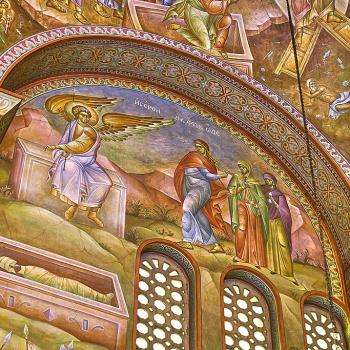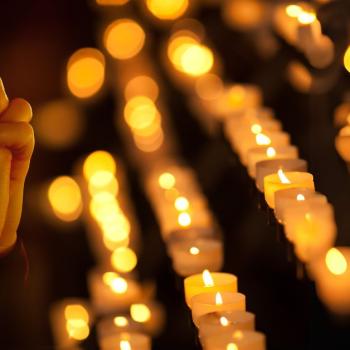Contrast that with today's situation. Rarely are pastors approached as figures of authority, except (sometimes!) within their own congregations. Radio, television, and the Internet are our primary authorities for the information we need, with newspapers, advertisements, and movies coming in a close second. For many American Christians, Beliefnet.com ("Your Trusted Source for Free Daily Inspiration & Faith") is a bigger authority on matters of Christian belief and practice than any pastor. We love self-help books, so we're more likely to read Spirituality for Dummies than to go to a group Bible study. Forty years ago people were influenced in their judgments about religious matters not only by their pastor but also by the editorials in the Religion section of their local newspaper. Today the blogs one happens to read are more likely to influence belief.
Where's the Revolution?
I'm almost embarrassed to list these differences, because they're so obvious. But here's the amazing fact: Denominations aren't changing. In most cases they're not planning for and investing in new forms of church for this brave new world. (There are some great exceptions.)
This is not a matter of blame. The assignment of the administrators who head up denominations is to run the organization that they've been given. I once heard a major national leader say to a group of similar leaders something like, "We all know that the ship is in grave danger, and it may go down. But we all seem to have the attitude, ‘Not on my watch!'"
Pastors have a bit more latitude. Individual pastors and churches are doing amazing things across the U.S. (and outside it); so are parachurch and extra-church groups, organizations, and ministries. But in most cases, it's the denominations that determine how pastors are educated, what kinds of ministries they can engage in, and what kinds of church assignments they get. A lot of young men and women lose their idealism in seminary. (That's a damning fact that I, as a seminary teacher, take very, very seriously.) If they have the good fortune to depart seminary with their idealism intact, they're generally assigned to a traditional church that has virtually no youth or younger families present, an average age of 60, and a major budget crisis on its hands. The orders are, "Keep this church alive!" The church members like the old hymns and liturgies; they don't like tattoos, rock music, or electronics. They are about as likely to read and respond to blogs as I am to play in the Super Bowl. So the young pastor folds her idealism away in a closet and struggles to offer the traditional ministry that churches want.
In short: the majority of our resources continue to be flung at traditional church structures. Those doing the real revolutionary work, those trying to envision -- and incarnate -- the church of the future struggle on with the barest of resources.
This is not smart. Let's do something different. Let's do it now.
Theology after Google
I used to think of theology as an academic discipline. Although about Christian beliefs, its primary goal was to meet the standards of the Academy. When I finally got the stars out of my eyes and began to look around more closely, I realized that the "trickle-down effect" -- the idea that the brainy books in academic theology flow through pastors to help congregations and ordinary Christians -- is no longer happening. If it ever did. By and large academic theologians are not addressing the questions that lay Christians are asking; or they're answering them so incomprehensibly that only other academic theologians understand them.
Now when I use the term "theology" I mean the questions that all Christians ask and the kinds of answers that ordinary people give, no matter how hesitating and uncertain. This new definition has a wonderful implication: theology is tightly bound to whatever church is at a given time. Theology is about what the church is now and what it's becoming. So "theology after Google" means: What must the church become in a Google-shaped world?
Here's my answer in five theses. Whether you love them or hate them, I hope you'll interact with them:
- Theology is not something you consume, but something you produce. In the Age of Gutenberg, you read theology in a book; you heard it preached in sermons; and you were taught it by Bible teachers. In the Age of Google, theology is what you do when you're responding to blogs, contributing to a wiki doc or Google doc, marking up a Word doc on your computer, participating in worship, inventing new forms of "ministry," or talking about God with your friends in a pub.
I remember participating in 1991 in the birth of what would eventually become the worldwide web. (People now call it Web 1.0.) One used a protocol called "ftp" to access documents on someone else's computer. No mouse and no pictures, but still amazing -- you could read someone else's stuff without needing a floppy disk! What most of us now do is Web 2.0. We contribute to, mold, and play at the places we visit; we go there to do things. (If you're unsure about this, watch a kid playing on the web. My seven-year-old twins will click on anything anywhere on any webpage to see what'll happen and what it will do. The idea that the Internet is about passive reading of content never occurred to them.)
- No institutions, and very few persons, function as authorities for theology after Google. Ever since Jesus' (often misunderstood) statement about Peter, that "on this rock I will build my church" (Mt. 16), the church has had issues with authority. The point is too obvious to need examples. The pastor standing up in the pulpit in the early 1960s was still a major authority. Of course, pastors still stand up in pulpits today, and some still view themselves as indispensable purveyors of truth.




